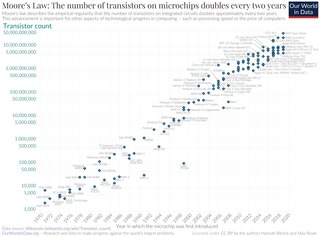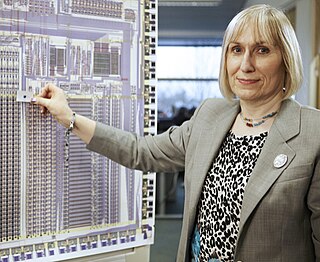Related Research Articles

An integrated circuit or monolithic integrated circuit is a set of electronic circuits on one small flat piece of semiconductor material, usually silicon. Large numbers of miniaturized transistors and other electronic components are integrated together on the chip. This results in circuits that are orders of magnitude smaller, faster, and less expensive than those constructed of discrete components, allowing a large transistor count. The IC's mass production capability, reliability, and building-block approach to integrated circuit design has ensured the rapid adoption of standardized ICs in place of designs using discrete transistors. ICs are now used in virtually all electronic equipment and have revolutionized the world of electronics. Computers, mobile phones and other home appliances are now inextricable parts of the structure of modern societies, made possible by the small size and low cost of ICs such as modern computer processors and microcontrollers.

The 6800 is an 8-bit microprocessor designed and first manufactured by Motorola in 1974. The MC6800 microprocessor was part of the M6800 Microcomputer System that also included serial and parallel interface ICs, RAM, ROM and other support chips. A significant design feature was that the M6800 family of ICs required only a single five-volt power supply at a time when most other microprocessors required three voltages. The M6800 Microcomputer System was announced in March 1974 and was in full production by the end of that year.
Silicon Valley is a region in Northern California that serves as a global center for high technology and innovation. Located in the southern part of the San Francisco Bay Area, it corresponds roughly to the geographical area of Santa Clara Valley. San Jose is Silicon Valley's largest city, the third-largest in California, and the tenth-largest in the United States; other major Silicon Valley cities include Sunnyvale, Santa Clara, Redwood City, Mountain View, Palo Alto, Menlo Park, and Cupertino. The San Jose Metropolitan Area has the third-highest GDP per capita in the world, according to the Brookings Institution, and, as of June 2021, has the highest percentage of homes valued at $1 million or more in the United States.

Moore's law is the observation that the number of transistors in a dense integrated circuit (IC) doubles about every two years. Moore's law is an observation and projection of a historical trend. Rather than a law of physics, it is an empirical relationship linked to gains from experience in production.

Acorn Computers Ltd. was a British computer company established in Cambridge, England, in 1978. The company produced a number of computers which were especially popular in the UK, including the Acorn Electron and the Acorn Archimedes. Acorn's BBC Micro computer dominated the UK educational computer market during the 1980s.

Sophie Mary WilsonDistFBCS is an English computer scientist, who helped design the BBC Micro and ARM architecture.

James Burke is a British broadcaster, science historian, author, and television producer. He was one of the main presenters of the BBC1 science series Tomorrow's World from 1965 to 1971 and created and presented the television series Connections (1978), and its more philosophical sequel The Day the Universe Changed (1985), about the history of science and technology. The Washington Post has called him "one of the most intriguing minds in the Western world".

BBC Television is a service of the BBC. The corporation has operated a public broadcast television service in the United Kingdom, under the terms of a royal charter, since 1927. It produced television programmes from its own studios from 1932, although the start of its regular service of television broadcasts is dated to 2 November 1936.

Barry Leslie Norman was a British film critic, television presenter and journalist. He presented the BBC's cinema review programme, Film..., from 1972 to 1998.

Stephen Byram Furber is a British computer scientist, mathematician and hardware engineer, currently the ICL Professor of Computer Engineering in the Department of Computer Science at the University of Manchester, UK. After completing his education at the University of Cambridge, he spent the 1980s at Acorn Computers, where he was a principal designer of the BBC Micro and the ARM 32-bit RISC microprocessor. As of 2018, over 100 billion copies of the ARM processor have been manufactured, powering much of the world's mobile computing and embedded systems.

BBC News is an operational business division of the British Broadcasting Corporation (BBC) responsible for the gathering and broadcasting of news and current affairs in the UK and around the world. The department is the world's largest broadcast news organisation and generates about 120 hours of radio and television output each day, as well as online news coverage. The service maintains 50 foreign news bureaus with more than 250 correspondents around the world. Deborah Turness has been the CEO of news and current affairs since September 2022.

Computer literacy is defined as the knowledge and ability to use computers and related technology efficiently, with skill levels ranging from elementary use to computer programming and advanced problem solving. Computer literacy can also refer to the comfort level someone has with using computer programs and applications. Another valuable component is understanding how computers work and operate. An individual's level of computer literacy is measured on the scale of how skilled they are when it comes to using computers and other related tools to achieve a goal. Computer literacy may be distinguished from computer programming, which primarily focuses on the design and coding of computer programs rather than the familiarity and skill in their use. Various countries, including the United Kingdom and the United States, have created initiatives to improve national computer literacy rates.

A computer is a machine that can be programmed to carry out sequences of arithmetic or logical operations (computation) automatically. Modern digital electronic computers can perform generic sets of operations known as programs. These programs enable computers to perform a wide range of tasks. A computer system is a nominally complete computer that includes the hardware, operating system, and peripheral equipment needed and used for full operation. This term may also refer to a group of computers that are linked and function together, such as a computer network or computer cluster.
Martin Young is a television reporter and interviewer.

The British Broadcasting Corporation Microcomputer System, or BBC Micro, is a series of microcomputers and associated peripherals designed and built by Acorn Computers in the 1980s for the BBC Computer Literacy Project. Designed with an emphasis on education, it was notable for its ruggedness, expandability, and the quality of its operating system. An accompanying 1982 television series, The Computer Programme, featuring Chris Serle learning to use the machine, was broadcast on BBC2.
Learning on Screen - The British Universities Film & Video Council (BUFVC) is a representative body promoting the production, study and use of moving image, sound and related media for learning and research. It is a company limited by guarantee, with charity status, serving schools, colleges and post compulsory education interests in the UK.
The British Broadcasting Corporation (BBC) is the national broadcaster of the United Kingdom, based at Broadcasting House in London, England. It is the world's oldest national broadcaster, and the largest broadcaster in the world by number of employees, employing over 22,000 staff in total, of whom approximately 19,000 are in public-sector broadcasting.
Information technology (IT) is the use of computers to create, process, store, retrieve and exchange all kinds of data and information. IT forms part of information and communications technology (ICT). An information technology system is generally an information system, a communications system, or, more specifically speaking, a computer system — including all hardware, software, and peripheral equipment — operated by a limited group of IT users.

The social history of the United Kingdom (1979–present) began with Conservative Prime Minister, Margaret Thatcher (1979–1990) entering government and rejecting the post-war consensus in the 1980s. She privatised most state-owned industries and worked to weaken the power and influence of the trade unions. The party remained in government throughout most of the 1990s albeit with growing internal difficulties under the leadership of Prime Minister John Major (1990–1997).
References
- ↑ "Now the Chips Are Down". BUFVC website. BUFVC . Retrieved 1 March 2013.
- ↑ Huws, Ursula (14 January 2004). "Chapter 15: The fading of the collective dream?". In Mitter, Swasti; Rowbotham, Sheila (eds.). Women Encounter Technology: Changing Patterns of Employment in the Third World. Routledge. p. 321. ISBN 978-0-203-20861-8. Archived from the original on 27 April 2012. Retrieved 27 February 2013.
- ↑ Young, Robert M.; Gardner, Carl (1981). "Science on TV: A critique". In Bennett, Tony; Boyd-Bowman, Susan; Mercer, Colin; Woollacott, Janet (eds.). Popular television and film: a reader. British Film Institute in association with The Open University Press. p. 173. ISBN 978-0-85170-115-8 . Retrieved 27 February 2013. Alt URL
- 1 2 3 4 Tom Forester (1987). The High-Tech Society: The Story of the Information Technology Revolution . MIT Press. p. 166. ISBN 978-0-262-56044-3 . Retrieved 27 February 2013.